Mom Tells Jealous Daughter to ‘Shut Up’ Over Sister’s Wedding
Family gatherings are supposed to be moments of joy, especially when it comes to planning a wedding. But for this mom, juggling the emotional aftermath of one daughter’s heartbreak while trying to celebrate another’s milestone turned into a ticking time bomb. With four kids, all at different life stages, this parent found herself trying to support everyone—until the weight of walking on eggshells finally broke her.
Her 25-year-old daughter Anna is preparing for the happiest day of her life, while her older sister Sarah, 32, still reels from a painful breakup. The family tried to be supportive, but Sarah’s grief gradually transformed into resentment and emotional outbursts that derailed every wedding discussion. After months of putting up with it, the mom reached a boiling point and told her daughter to “shut up”—a moment she now regrets. But was she truly out of line, or just being a parent trying to hold the family together?
Giving someone a “reality check” can backfire on you

A woman experienced this with her older daughter, whom she’s had difficulty dealing with
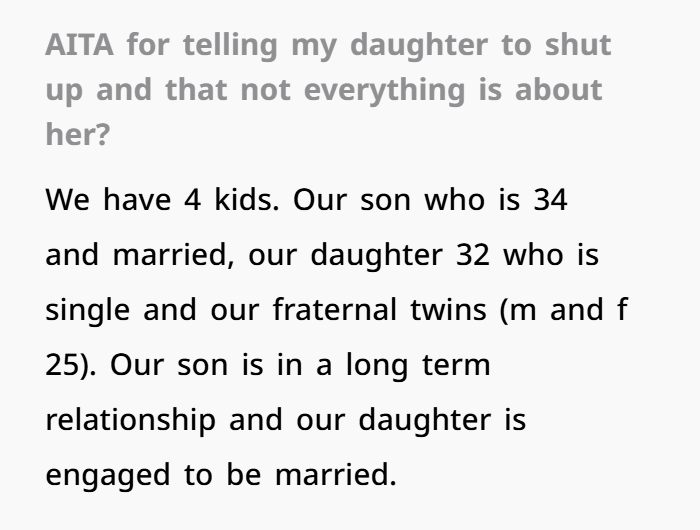
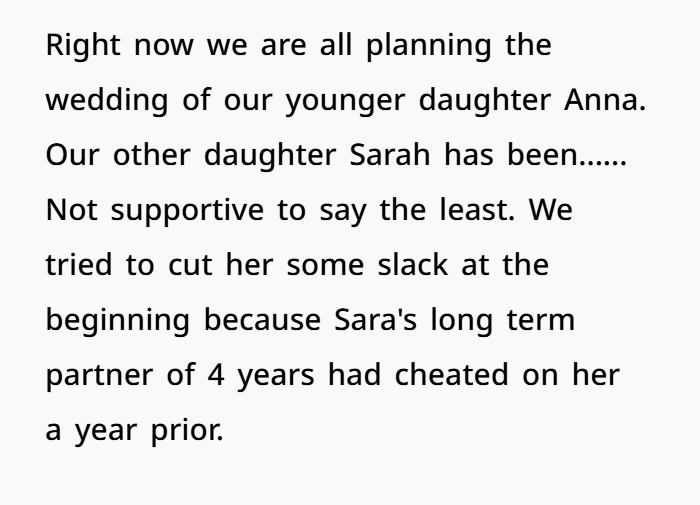
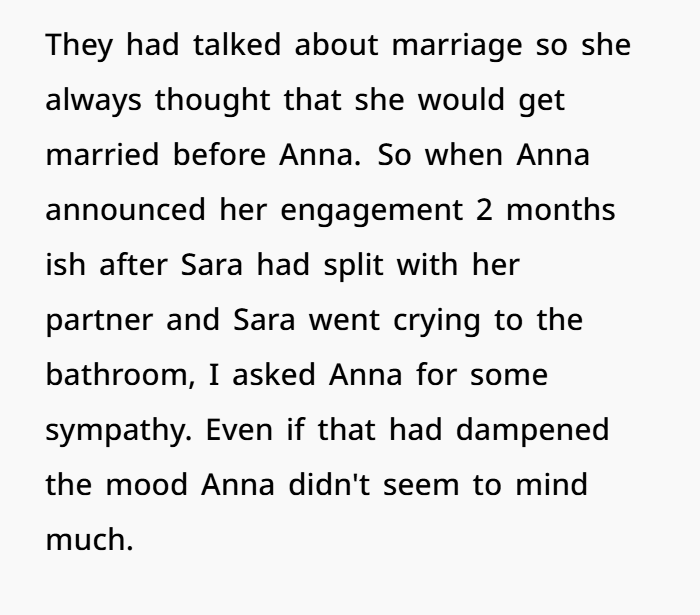
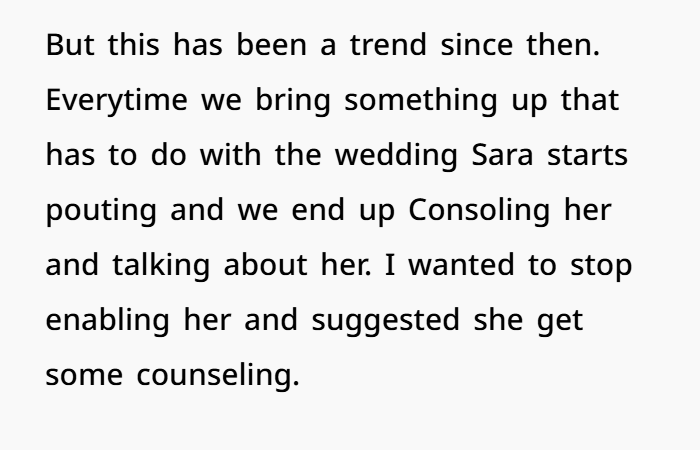
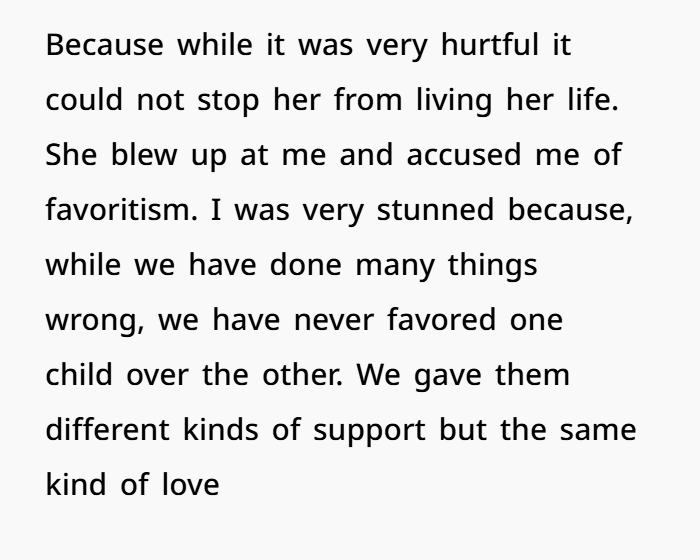
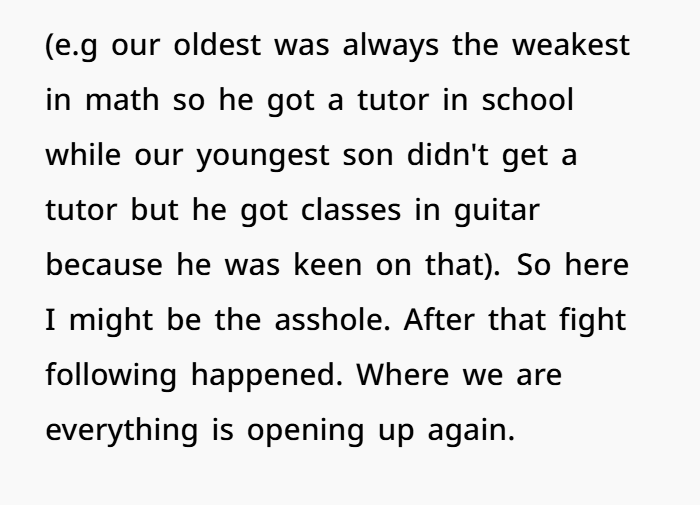
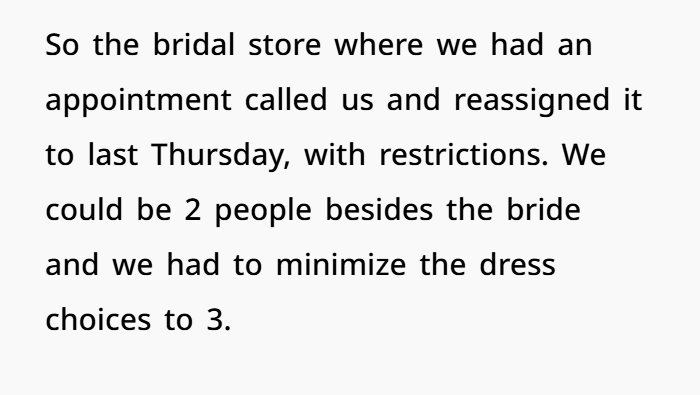
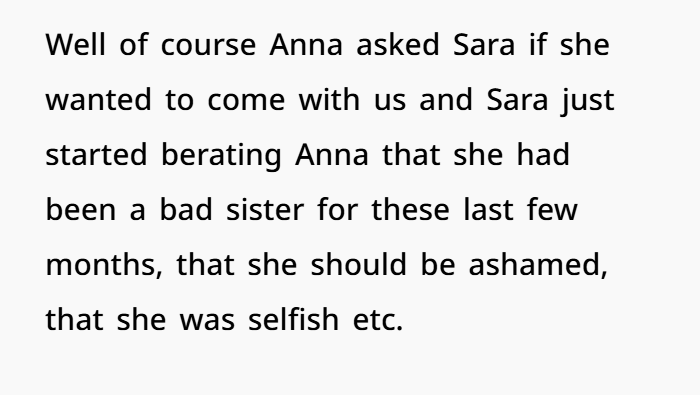
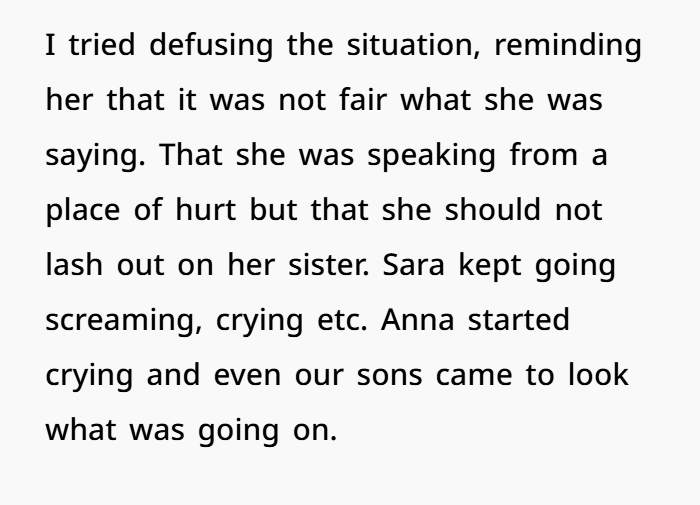

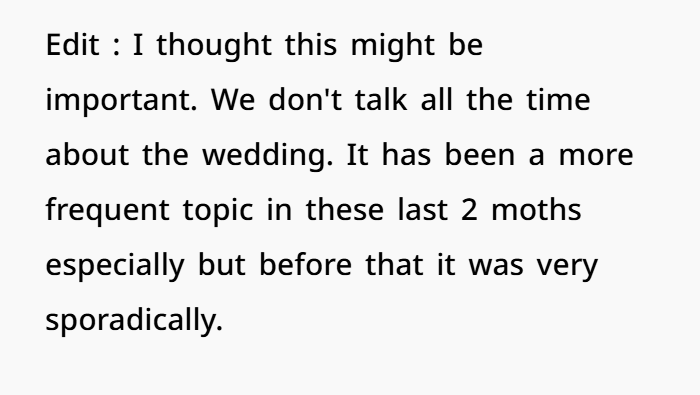

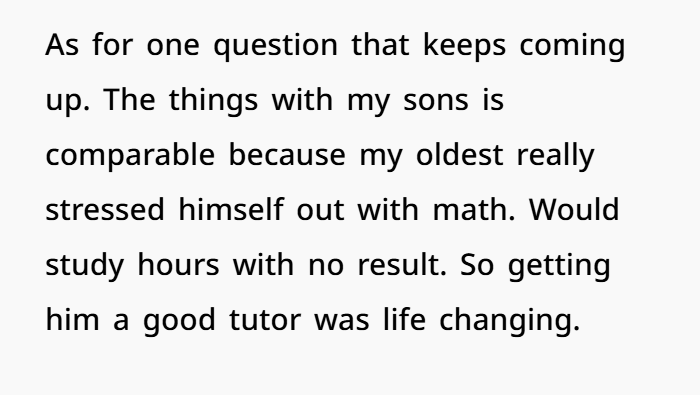
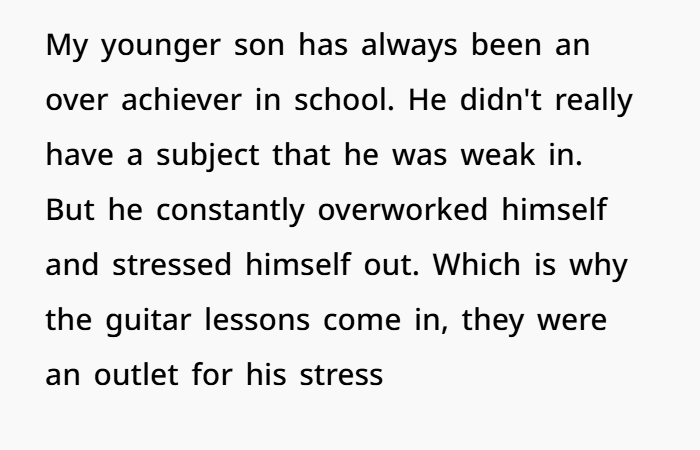
Let’s be real here. This situation? It’s messy. And if you’ve ever tried balancing multiple family dynamics, you know how emotional landmines can go off unexpectedly—especially during a major life event like a wedding.

But before judging anyone, it’s important to unpack what’s really happening here. It’s not just about a wedding. This is a complex blend of emotional trauma, unresolved sibling rivalry, and the universal struggle of parenting adult children with boundaries.
💔 Post-breakup grief is real, even if it’s been a year
So first up: Sarah. She was in a four-year relationship, thinking marriage was around the corner. Then boom—cheating, breakup, and the rug pulled from under her. Yeah, it’s been a year, but grief over broken relationships doesn’t follow a timer.
According to mental health experts, emotional trauma from infidelity can mirror PTSD. Studies show that betrayed partners often experience hyperarousal, emotional flashbacks, and rumination, even a year or more after the breakup (source).
Throw in the fact that her younger sister is getting married while she’s still processing betrayal? That’s gonna sting—hard.
But—and this is a big but—that doesn’t give Sarah a free pass to emotionally hijack her sister’s wedding.
🧠 Why emotional regulation matters—especially in adulthood
Here’s the thing: Emotional pain doesn’t justify emotional outbursts that hurt others. Adults, especially those in their 30s, are expected to manage their own emotional wellbeing. That includes seeking mental health counseling if things feel overwhelming.
And yeah, the mom did suggest therapy. That wasn’t cold or dismissive—it was appropriate. In fact, family therapists recommend therapy as a key step when one family member’s trauma begins to affect group dynamics.
Keywords like family therapy near me, emotional support services, and mental health resources are trending in this context—and for good reason. These services help people like Sarah process grief without damaging their relationships.

💍 Wedding planning can unearth old wounds
Weddings, by nature, bring up all sorts of deep-seated emotions. People reflect on where they are in life, compare themselves to others, and sometimes, fall into the “why not me?” trap.
Sarah might feel like life skipped over her. And when she sees her younger sister living the dream she thought she’d have first, it probably feels like a slap in the face. That’s not Anna’s fault. But the emotional pain is still real.
Sibling rivalry doesn’t just disappear in adulthood—it just changes shape. According to researchers, when adult siblings feel one is being favored or is “winning” at life, it can rekindle childhood insecurities.
The mom here insists they never played favorites. And from the examples she gave—supporting different kids based on needs—it sounds like she’s telling the truth. But perception is reality, and maybe Sarah felt overshadowed even if she wasn’t.
👩👧👧 Setting healthy boundaries: Not everything is about you
So let’s talk about that moment—the “shut up” moment. Was it harsh? Yeah, probably. Could it have been phrased better? Absolutely. But was it unreasonable? Honestly, no.
There’s a concept in parenting adult children called “emotional boundaries”. It means knowing when to offer support and when to draw the line. You can’t let one child’s grief drown another’s joy forever.
By letting Sarah’s grief dominate the conversation, the family was unintentionally reinforcing her behavior. That’s classic emotional enabling. The mom’s outburst, while blunt, was a way of saying: enough is enough.
It’s not about silencing Sarah’s pain—it’s about making space for everyone’s joy too.
🧭 What could this mom do now?
Okay, so where do we go from here?
Here’s a few steps this mom could take, backed by expert advice:
- Reach out to Sarah — but not to apologize for the boundary. Just to say, “I love you. I see you’re hurting. Let’s find a better way to deal with this.”
- Suggest family therapy — again. Not to “fix” Sarah, but to help everyone understand each other better. Use phrases like family therapy for grief or relationship trauma counseling if she’s resistant.
- Support Anna fully — it’s her time. Don’t let guilt over Sarah’s situation ruin it.
- Let Sarah make her own healing decisions — if she refuses help, that’s on her. Sometimes tough love is love.
The author provided more information by answering some questions
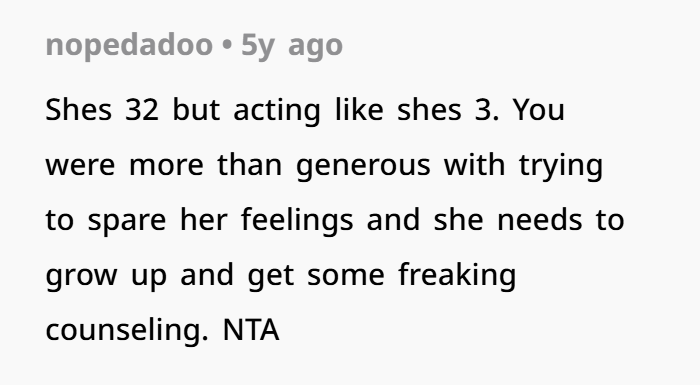
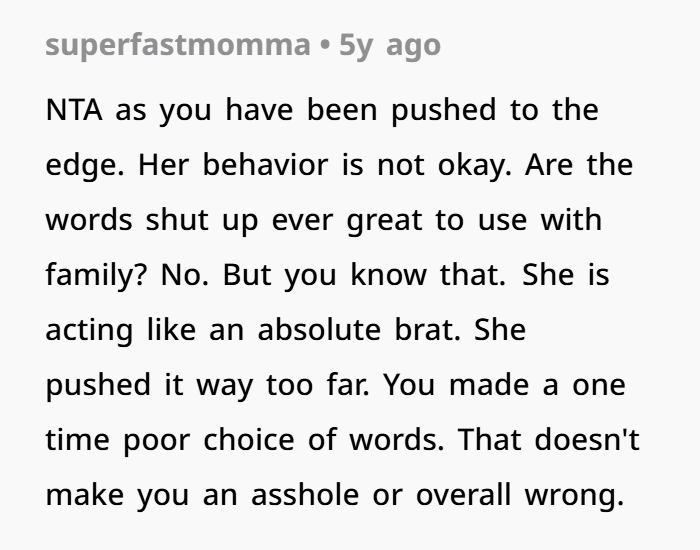
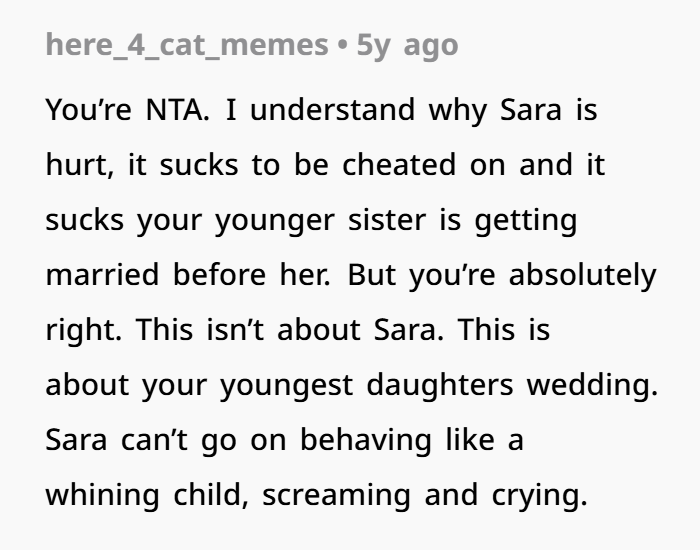
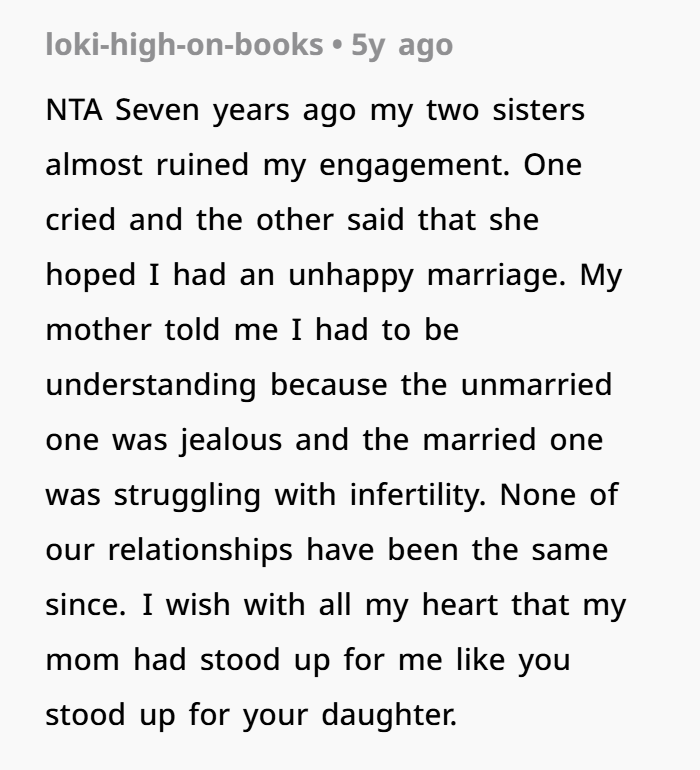
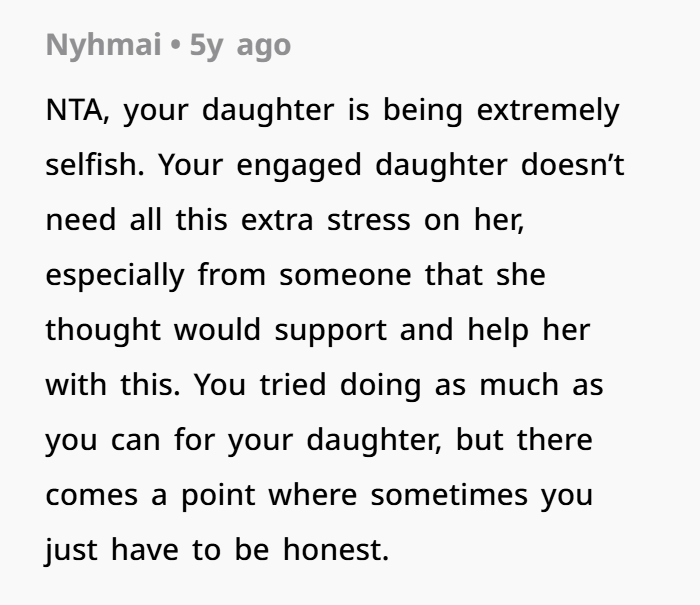
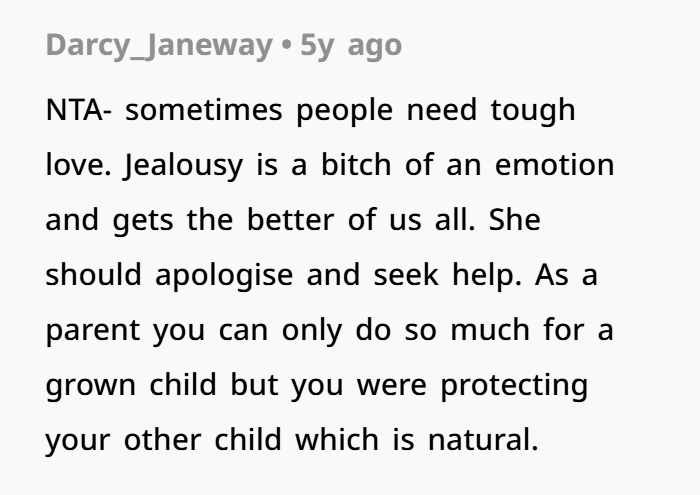
Weddings aren’t just about dresses and vows. They bring out years of emotions, insecurities, and dreams—some realized, others crushed. This mom did what many of us would do—try to support everyone until she couldn’t anymore.
So, AITA for telling her daughter to shut up and that not everything is about her?
From where I’m sitting? Not the A-hole. Just a human, doing her best in an impossible situation.

